
Airchecks: 1967
Talent: TOM
WAYNE
Station: KFIF
Tucson, Arizona
Date: January 1, 1967
Time: 47:01 (unscoped)
17:55
(scoped)

Tom Wayne counts down the Top Hits of 1966 on the long-defunct KFIF Tucson. Oddly, he doesn't identify himself until AFTER the countdown is over,
Enjoy Tom
Wayne with
the KFIF 1966
Top Hits Countdown (UNSCOPED) here. ![]()
Enjoy Tom
Wayne with
the KFIF 1966
Top Hits Countdown (SCOPED) here. ![]()
(The Joe Fazio Collection)
Subject: THE
BEST of HELLO TORONTO with JAY NELSON
Station: CHUM
Toronto
Date: 1967
Times: Various
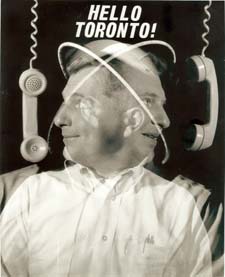
(Graphic courtesy Doug Thompson)
Toronto said hello to Jay Nelson and he responded with Hello Toronto.
Shortly after arriving at CHUM in December '63, the jock known at the time as Jungle Jay Nelson began a series of comedy bits that ran on his morning show until 1968 (later he would be known as just Jay Nelson*.)
The idea was a direct offshoot of Hello Buffalo, a bit Nelson did on his WKBW-TV Buffalo show before his arrival at CHUM. Nelson would phone someone at random, and playing a character, would involve both parties in whatever off-beat and zany idea he and his creative partner Allen Farrell had dreamed up. The segments were taped, and ran at 6:45, 7:45 and 8:45 a.m. With Nelson's skill at voices and ability to improvise, Farrell's creative genius and the production talents of Claude Deschamps, the segments became very popular.
Hello Toronto became Nelson's signature feature - but it was a lot of work. As Farrell points out in his book The CHUM Story, Nelson taped the bits right after his morning show ended. Sometimes it would take 20 or more calls to find a winner. Farrell would write lead-ins and gags and Deschamps would then create a polished version in production.
Fred Bradley of CVUE-FM in Sechelt, B.C., has sent us many samples of Hello Toronto from 1967 that were apparently found at a Salvation Army! The best of these previously undiscovered treasures can now be heard right here at Rock Radio Scrapbook.
"Singing
Flowers" (2:17)
![]()
"Bananas"
(4:04)
![]()
"Maude the
Typist" (3:20)
![]()
"Dropping a
Load" (2:17)
![]()
"Friday the
13th" (2:41)
![]()
"Shut Out"
(2:48)
![]()
*Nelson's last appearance on the CHUM Chart as "Jungle" Jay Nelson was
October 18, 1965. He appears as just Jay Nelson on the CHUM Chart of November
22, 1965.
(The Fred Bradley Collection)
Be sure to listen to Fred Bradley on C-VUE FM in Sechelt, B.C.
Talent: JACK
ARMSTRONG
Station: WKYC
Cleveland
Date: January
5,
1967
Time: 27:39
(unscoped)
10:50
(scoped)
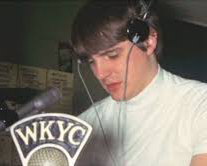
For a time, one of Top 40 radio's greatest jocks couldn't use his own air name.
In January, 1967, Jack Armstrong started at WKYC after breaking his contract at Cleveland rival WIXY. Because of the contract breach, Armstrong was not allowed to call himself Jack Armstrong on-air at WKYC, so he used "Big Jack" instead, later calling himself "Jack W. Armstrong."
WKYC was one of more than two dozen North American stations Armstrong jocked at starting with WCHL in Chapel Hill, North Carolina. in 1960 at the age of 14. His last radio gig - at WWKB Buffalo, New York - ended in 2006.
Jack Armstrong died March 23,
2008 after a fall at his home in High Point, North Carolina. He was 62.
Enjoy
Jack Armstrong on
WKYC (UNSCOPED) here.
![]()
Enjoy
Jack Armstrong on
WKYC (SCOPED) here.
![]()
(The Don Shuttleworth Collection)
Talent: KRIS
K. CLARK
Station: WYSL
Buffalo, New York
Date: January
8, 1967
Time: 5:47

It was known as "The Toy Bulldog," the little station that could.
For 20 years - from 1966 to 1986 - WYSL played the hit music of the day in Buffalo. And while its time as a rocker is long gone, its memory is still very much alive, thanks to former WYSL jock and Rock Radio Scrapbook contributor Paul Palo.
Palo tells us about his early days at WYSL:
"The winter of 1967, Frank Sedita is mayor of Buffalo, the Green Bay Packers won the Super Bowl and the Bills with Jack Kemp at QB finished a disappointing 4-10 record at the old Rock Pile. We were known as little Whistle or WYSL 1400 (the best we could do for a low power at night AM). I was fresh off the boat from Erie Pa and took over the all night show for (I think Bob Day). Kevin O'Brien was 7-Midnight on the 18th floor of the Statler Hilton Hotel in downtown Buffalo across the street almost from City Hall. Larry Vance hired me to do 9 to 12 noon, but I had to pass the on-air audition at 12 midnight.
I remember that first night on the air, because I was a twitching nervous 21 year old baby face kid who Kevin was making numerous jokes about "Chris Clark being wet behind the ears and and shoes". He had sort of a hipster delivery that you would hear on R & B stations at the time: (like : "Ya babies" and "dig it") and laugh like hell at me. He knew how to get to me, but it was never a mean thing, it was his real personality and in fact he was a real warm guy off the air. The quietest people become crazy wild when the red light comes on.
Somehow I managed to scream my way thru an hour of what it was then using a name I had never used and running equipment I had never used listening on air with earphones crackling with the actual air feed with heavy echo and bad reception. Because of the slight delay It was like a was hearing some guy from outer space. So it was Chris Clark or Kris K Clark (never was real sure) but it could have been Shad O'Shea (a name they first wanted me to use).
There I was for the next few months with a dingy one room apartment down on Delaware Ave in the same building with Larry Vance and Charlie Brown, the guy who worked just after me and Kevin O'Brien. I had worked with Charlie Brown (Larry Snyder) in Erie, Pennsylvania. He got me the gig and convinced Vance that between the two of us we would work for almost the wage of one jock combined. I think it was $125 a week. We would meet every evening at Sinatra's right across the square for beer and hot sausage sandwiches with cheese and onions on a kind of hot dog bun. We lived on those things and Frank (yes Frank Sinatra) put up etchings of all the jocks (Good Guys) on the wall like it was The Brown Derby or something and we were celebs. Anyway that was our local clubhouse for a while and if anyone wanted to find one of us, they just called " Frank" and he even would keep messages for us as well. No message machines in those days so that was our line of communication. No-one had a phone at the apartment building, because we were cheap and used the pay phone. So that was our life, walk to work, go to Sinatra's at night and hang out till its time to go to sleep with an occasional concert or date thrown in for variety.
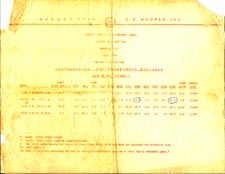
(Chris Clark got the ratings, as evidenced by this 1968 Hooper rating sheet (above). Take a closer look here.)
At the studio we would order from the Statler menus if we were working and even had room service come up to the 18th floor if we desired. There were always plenty of young women to date because the 17th floor of the Statler was a dorm for female students at Buffalo State and they would always be hanging out on the 18th floor with the jocks. Also part of the deal with the station is that we had to wear blue blazers with the call letters on the front in public. Cheap advertising!!
A few months later Gary Byrd would take over the 7 to midnight show (first African-American to work Top 40 radio in Buffalo) and then finally Tim Kelly arrived as the evening jock when Gary moved on to NYC I believe. Tim and I became good friends and along with Jack Mindy who took over drive time we decided to rent a big carriage house on Elmwood Ave.
It was like three is company: Mindy had a foreign sports car called a Torino, Tim got a Mustang convertible and I had a black Cougar and we even had a heated garage downstairs. That was like as good as it gets in the cold winters in Buffalo. We had a big stereo that we all chipped in to buy and all the music you could imagine. Needless to say we had plenty of company at any given time. I remember hearing for the first time, Sgt Pepper by the Beatles back in 1967 at the apartment and we must have played it 50 times trying to hear those reported secret messages. We saw Hendrix Dylan & Janis at Memorial Auditorium and traveled quite a bit to hang on Yonge Street in Toronto to see groups like Blood, Sweat And Tears and Joni Mitchell in a small coffee house.
On the air we made our radical political views known to the shock of the conservative McLendon Corporation. Despite all the political upheaval with the Vietnam War and the civil rights movement and the self realization & drug experimentation, we all felt as one and that we were part of a giant movement that would change things forever. It was our Buffalo "Summer of Love."
Enjoy
Kris K. Clark - a.k.a.
Paul Palo - on
WYSL from January 8, 1967 here.
![]()
(The Paul Palo Collection)
Talent: JAY
DOUGLAS
Station: CFCO
Chatham, Ont.
Date: January,
1967
Time: 17:05
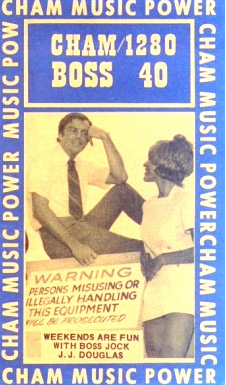
Roy Geldart writes about his friend, fellow broadcaster Jay Douglas...
"Jefferson Jay Douglas, (real name Jim Ernst) grew up in Mahone Bay, Nova Scotia where one of his hobbies was Broadcast Band DXing, which led to his desire in becoming a radio announcer. He pursued that interest in his late teens at nearby CKBW, Bridgewater, and CJCH Radio and TV in Halifax, NS; eventually moving on to business endeavours as well as radio and TV work in other markets. J.J. Douglas was later on CFCO Chatham, ON; and CHAM Hamilton.
During his broadcasting career, he was also a TV News Anchor in Honolulu, and a jock at beautiful music station, 2CH in Sydney, Australia.
In later years, he was in business in Austin, TX, where he died on December 8, 2022 at age 80."
Enjoy Jay Douglas at CFCO
here.
![]()
(The Roy Geldart Collection)
Talent: HUMBLE
HARVE
Station: KHJ
Los Angeles
Date: February
1, 1967
Time: 1:02:53
(unscoped)
26:45 (scoped)
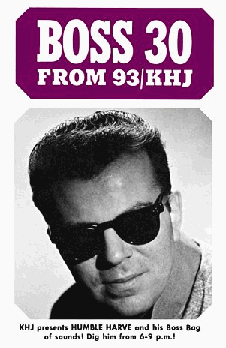
Humble Harve raised the "cool" factor at KHJ more than a few degrees.
The laid-back jock - who would have been a perfect fit for any of the emerging FM progressive rock stations at the time - was hired as the 6-9 p.m. jock at KHJ in February 1967.
KHJ was already a pretty cool place with jocks like Robert W. Morgan and The Real Don Steele, but adding Humble Harve to the mix was a brilliant move, especially considering that he got a 21.0 share during his four years at the Big 93.
Enjoy Humble
Harve's first show at KHJ (UNSCOPED) here. ![]()
Enjoy Humble
Harve's first show at KHJ (SCOPED) here. ![]()
(The Don Shuttleworth Collection)
Talent: BRIAN
SKINNER
Station: CHUM
Toronto
Date: Early
1967
Time: 9:33
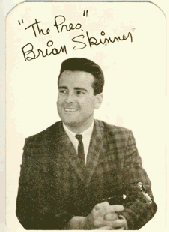
(CHUM Archives/Doug Thompson)
With his cornball humour and cleverness in doing voices, Brian Skinner was a popular presence at CHUM throughout the '60s. He started as a weekender in 1961 and four years later took over the 7-10 shift previously occupied by Dave Johnson. But in 1968, Jack Armstrong came along and with it, Skinner's early evening shift,
Skinner was initially pushed back to 9 p.m.-midnight, then in August 1969 was relegated to the all-night show Armstrong took over evenings. After a year of working 11 p.m.- 5 a.m., Skinner - his style of radio no longer no longer welcome at CHUM - quit. He never worked in radio again and never participated of any of the CHUM reunions.
Skinner taught in Seattle for many years, his reign as "The Prez" just a memory. His son Kori - who sounded remarkably like his dad - jocked at CHUM in the '90s. But there was only one "Prez."
Enjoy Brian
Skinner on CHUM from
early 1967 here. ![]()
(The Bill Dulmage Collection)
Talent: JIM
JEFFRIES
Station: WKNR
Dearborn, Mich.
Date: February,
1967
Time: 9:18
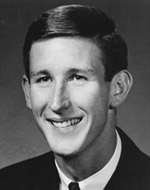
We remember a time when Top 40 stations were live and local 24 hours a day. More than ever, we miss the all-night jock.
Some of the most enjoyable radio listening in the Top 40 era seemed to come after midnight. In our case - in southern Ontario - we enjoyed Bob Laine on CHUM, Norman B. and John Donabie on CKFH, Bob Church on CKOC, Charlie Greer on WABC, Bob McCrae on WKBW, Bob Dearborn on Nighttime America (via WBUF), Yvonne Daniels on WLS, Joe Donovan on WHAS, even Larry King's talk show on WBEN, just to name a few.
Late-night Detroit listeners in the mid-'60s could tune in Jim Jeffries. He did the all-night show on WKNR from 1965 to 1967.
Hear Jim Jeffries here.
![]()
(The Don Shuttleworth Collection)
Talent: BILL
McVEAN
Station: CFRB
Toronto
Date: March,
1967
Time: 4:16
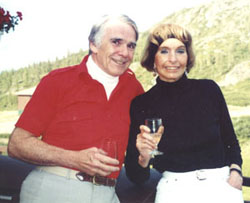
(Bill and Catherine McVean/Courtesy Bill McVean)
Close your eyes and you can still hear the voices.
Wally Crouter in the morning, with Earl Warren's House of Warren on middays, and Bill McVean and Betty Kennedy in the afternoon. Then the Bill Deegan Show which led into Ray Sonin's Down Memory Lane, followed by Starlight Serenade which for many years was hosted by George Wilson. Then Wayne Van Exan with The Owls Nest all night.
Those were the weekday programs and program hosts at CFRB, a lineup that remained remarkably stable from the mid'-60s to the late '70s. All but Crouter were gone from those time slots by the end of 1990, and The Crout also left after 50 years at 'RB in 1996.
Born in Windsor, Ontario, and raised in Woodstock, Ontario, Bill McVean served in the Canadian Air Force in the Second World War. Following the war, in 1945, McVean was asked to set up an armed forces radio station as part of his public relations duties. He obviously got the radio bug because the next year - 1946 - he had his first job in commercial radio at CKNX Wingham, Ontario.
McVean moved to CKOC in 1949, then to Hamilton rival CHML in 1952 or '53. After a few years doing freelance work for the CBC, he started at CFRB in the all-night show around 1958. By the mid-60s, McVean was on from 1-3 p.m. McVean also did editorials such as Let's Be Personal and Dialogue, where he first teamed up with Percy Saltzman and later Bob Hesketh.
McVean's regular weekday duties ended in 1985 as CFRB moved into talk. He continued with weekends and Trips 'N Tips at CFRB until 1996, when he moved to CFMX Cobourg, Ontario. Trips 'N Tips was heard on AM 740 Toronto in the 2000s. In 1991, he began his involvement with VoicePrint, an audio service for the visually impaired.
McVean, who credits his wife Catharine for much of his success, says he misses the radio that was but not the radio that is. To that, we say amen.
Enjoy
Bill McVean on
CFRB here.
![]()
(The David Lennick Collection)
Talent: ROY
GELDART
Station: CFNB
Fredericton
Date: March,
1967 (Upgraded
7-14-12)
Time: 7:10

Roy Geldart is well-known for his on-air work with CBC News, but did you know he was a deejay in his early days in the business?
Geldart worked at CKBW Bridgewater, Nova Scotia, in 1965, before moving to CFNB Fredericton in 1966. CFNB was playing country music in '66, but had switched to Top 40 at the time of this aircheck in 1967.
Hear Roy Geldart here.
![]()
(The Roy Geldart Collection)
AUDIO ENHANCEMENT by Andy Rebscher
Subject: WABC
STRIKE MONTAGE
Station: WABC
New York
Date: March-April,
1967
Time: 5:55
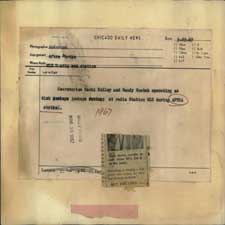
(Chicago's WLS
also needed fill-ins during the AFTRA strike.)
(Larger view here.)
The jocks were gone, but the rock went on.
From March 29 to April 10, 1967, a strike by the American Federation of Television and Radio Artists (AFTRA) forced radio and TV stations in the U.S. to scramble to find on-air talent. WABC was no exception, as managers took the place of union air staff during the 13-day labour action.
On this aircheck, you'll hear ABC press relations executive Marty Grove filling in for all-night man Charlie Greer. Chief engineer Bernie Koval - calling himself Bernie the K - takes over for midday man Ron Lundy. John Rook - then program director of Pittsburgh's KQV but headed to the same position at Chicago's WLS - subs for afternoon driver Dan Ingram as Johnny Rowe. And WABC assistant program director Jeff Berman takes the place of night-time jock Cousin Brucie.
"There weren't many glitches during the strike," Grove told musicradio77.com in 2007. "Management seemed pleased. It was an exciting time. I think we were just hitting our stride and liking it when the strike ended."
Enjoy the Strikebound Sound of WABC here.
![]()
(Scrapbook archives)
Subject: WABC
"SUPER PICKETS" PROMOS
Station: WABC
New York
Date: March-April,
1967
Time: 1:51
Program director Rick Sklar found promotional ideas in everything, including the WABC strike of 1967.
Listen to a couple of
WABC "Super
Pickets" promos here.
![]()
(Scrapbook archives)
Talent: BILL
BROWN
Station: KGB
San Diego
Date: April
6, 1967
Time: 40:01 (unscoped)
4:46 (scoped)
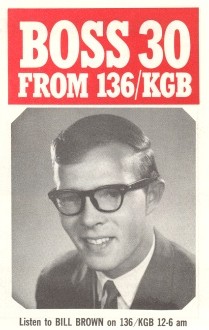
Before he played New York's Greatest Oldies, Bill Brown was a Boss Jock.
A native of Lawrenceville, Georgia, Brown got his first radio job at the age of 15 at WCLB in Camilla, Georgia. He then went went to jock at three California stations before joining the U.S. Navy and serving in Tokyo. While there, he was also the program director and DJ at the Far East Radio Network.
Brown got his big break in 1964 when he landed a job at the #1 station in San Diego, Drake-Chenault's KGB. In 1968, he was transferred to WOR-FM in New York then two years later left Drake-Chenault for pre-oldies WCBS-FM. Brown spent 36 years at 'CBS, where he gained fame for his "Brown Bag" lunch-hour special. He was the final jock on WCBS-FM before it switched to the Ill-fated Jack format in 2005. It was Brown's last on-air gig.
Enjoy Bill Brown on KGB (UNSCOPED) here.
Enjoy Bill Brown on KGB (SCOPED) here.
(The Don Shuttleworth Collection)
Talent: DEX CARD
Station: WLS Chicago
Date: April 16, 1967
Time: 43:21 (unscoped)
20:24 (scoped)
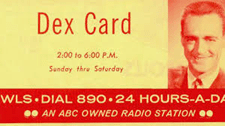
WLS had a "Card Party" every afternoon during the mid-'60s.
Dex Card - whose WLS show was naturally called the "Card Party" - replaced Bob Hale in WLS's 2-6 p.m. shift in May 1964. Card, who as a youngster used to practice being a DJ by using a hair brush as a microphone, started in radio in Portland, Maine, when a fellow announcer failed to show up for a shift. He was later drafted into the U.S. military during the Korean conflict. He served in Germany and wound up with the Armed Forces network. Card later worked at several major market stations, including WHIM in Providence, Rhode Island, WADA New York, WCOP Boston and WERE Cleveland.
One of Card's duties at WLS was to play the "Silver Dollar Survey", a ranking of the station's top hits of the week. As an added bonus, he would play the Silver Dollar Survey's #1 song from a year ago, and he was always adding tidbits about the songs and the artists, Casey Kasem style.
Card left WLS in 1967 (his replacement was Larry Lujack). The veteran jock did some fill-in work at rival WCFL and later owned stations in Wisconsin before selling them in 1989. He retired four years later and passed away in Florida on September 11, 2018
Enjoy Dex Card at WLS (UNSCOPED)
here.
![]()
Enjoy Dex Card at WLS (SCOPED)
here.
![]()
(The Don Shuttleworth Collection)
Talent: JOHNNY
WALKER
Station: WALT
Tampa, Fla.
Date: April 23, 1967
Time: 31:28 (unscoped)
9:35 (scoped)
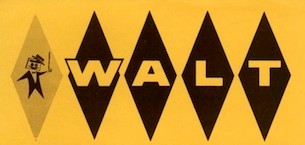
WALT got off to a wild and "Wooley" start as a Top 40 station.
Previously a middle-of-the road outlet, the Tampa Bay-St. Petersburg station switched to Top 40 in December 1958 by playing Sheb Wooley's "Purple People Eater" over and over again. The next day listeners were introduced to the "New WALT", which held its own against rival WLCY despite the handicap of being only a dawn-to-dusk operation.
Future CHUM, CKFH and KEY-590 jock John Rode was among the many to work at WALT during its decade-long life as a hit music outlet. After a brief switch to an MOR-style format in 1968, the station flipped to country as WQYK in 1970.
Enjoy Johnny Walker on WALT (UNSCOPED)
here.
![]()
Enjoy Johnny Walker on WALT (SCOPED)
here.
![]()
(The Joe Fazio Collection)
Talent: JOHN
R. (RICHBOURG)
Station: WLAC
Nashville, Tenn.
Date: 1967
Time: 7:48 (Upgraded
7-17-12)
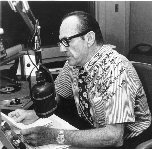
In today's high-tech world, it's hard to imagine a time when radio listeners tuned in through static and fading signals to hear the music they loved.
But that was indeed the case with the high-powered AM stations of yesteryear. Their night-time signals reached places faraway from their transmitters.
This long-distance reception made national stars out of night-time personalities who - had they been on during the day - might have been local stars only. One man who benefited from this was John R.
John Richbourg - he called himself John R. on-air - did a nighttime R&B show on WLAC Nashville for many years ending in 1973. Thanks to WLAC's powerful signal, he and fellow announcers Gene Nobles, Hoss Allen and Herm Grizzard could he heard throughout North America, depending on how the signal was performing that night.
Thanks to the Internet, we can relive those days - and you don't even need an antenna.
Enjoy John R. on WLAC here.
![]()
(Scrapbook archives)
AUDIO ENHANCEMENT by Andy Rebscher
Talent: JOHN
R. (RICHBOURG)
Station: WLAC
Nashville, Tenn.
Date: Spring
1967
Time: 4:14
You can never get enough of John R., so here's another.
Enjoy John R. on WLAC here.
![]()
(Scrapbook archives)
Talent: BOB
LEWIS
Station: WABC-FM
New York
Date: June, 1967
Time: 30:43/27:23
(unscoped)
13:27/5:18 (scoped)

It would be a turning point in radio history.
In the late '60s, U.S. AM stations that also had an FM side were figuring out how to deal with newly-passed FCC legislation requiring them to provide at least 12 hours of original FM programming a day.
One solution was to experiment with the new album rock, or progressive rock, format that was just coming into its own at the time. It was an unforgettable era as programmers, freed from the restrictions of the Top 40 format, experimented with long album cuts, themed music "sets" and a totally laid-back approach usually only heard on jazz stations.
Many deejays who had made their mark in AM radio were eager to test the FM waters. Tom Donahue, Dave Mickie/Marsden and B. Mitchell Reed are three prominent examples. Another is Bob Lewis. One of the All-Americans at WABC-AM in the 1960s, Lewis did a ground-breaking show called Some Trust In Chariots, on WABC-FM in the late '60s. Two other WABC-AM jocks had shows on WABC-FM, Chuck Leonard with Swingin' People and The Other Dan Ingram Show.
Hear
Some Trust in Chariots - a few days after the
Sgt. Pepper's album was released - with
Bob Lewis (Part
1 - UNSCOPED)
here.
![]()
Hear
Some Trust in Chariots - a few days after the
Sgt. Pepper's album was released - with
Bob Lewis (Part
1 - SCOPED) here.
![]()
Hear
Some Trust in Chariots - a few days
after the Sgt. Pepper's album was released - with
Bob Lewis (Part
2 - UNSCOPED) here.
![]()
Hear
Some Trust in Chariots - a few days
after the Sgt. Pepper's album was released - with
Bob Lewis (Part 2 - SCOPED) here.
![]()
(Scrapbook archives)
Talent: BOB
DRAKE
Station: CKLW
Windsor, Ont.
Date: June 13,
1967
Time: 10:17
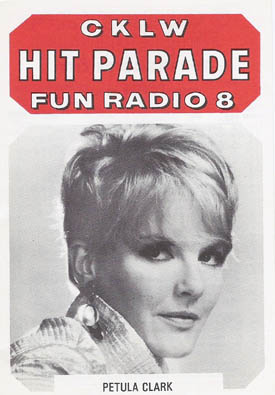
(CKLW chart cover from June 14, 1967)
Two months into the Drake format, CKLW actually had a deejay named Drake.
Bob Drake was part of a station that by the summer of 1967 featured jocks like Dave Shafer, Gary Mitchell, Mike Rivers, Bob Todd, Tom Shannon and Billy Mack. We know about them. But the only knowledge we have of Bob Drake is this aircheck from June, 1967. He sounded pretty good - what happened to him? He seemed to fit his namesake format pretty well, a format that launched on 'CK in 1967.
Who was Bob Drake?
Thanks to Charlie O'Brien
- himself a CKLW jock
- we have our answer.
"Bob Drake's
real name is
Tom Brownlie
and he went to
CKLW
from upstate NY where he worked with
Pat Holiday
(maybe Albany.) Anyway he was snapped up by
J. Robert Wood
to come to work for
CHUM
as
"Dr. Don Regen."
He was the guy who recommended
Pat Bergin
(on air at
CKLW
as
"Dean Scott")
to
Bob Wood
- Pat became
"Scott Carpenter"
on
CHUM."
Enjoy
Bob Drake here.
![]()
(The Russ Horton Collection)
For more great 'CK checks, visit The CKLW Years
Talent: CASEY
KASEM
Station: KRLA
Los Angeles
Date: June
16, 1967
Time: 8:50
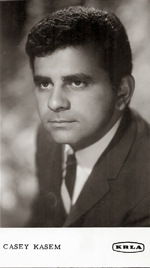
A lot has been written about Casey Kasem - co-founder of American Top 40 and one of North America's most recognized voices - but here's a few things you might not know:
- He wanted to become a professional baseball player before moving into radio.
- Started in broadcasting in 1950 as a paid intern at WDTR Detroit.
- Hosted a children's show called "Krogo the Clown" on WJBK-TV in the 1950s.
- Kasem started using his weekly sign-off, "Keep your feet on the ground and keep reaching for the stars" at WJBK Detroit in 1956.
- Got interested in stories about music when he spotted a copy of Who's Who in Popular Music 1962 in a trash can just before his first shift at KEWB Oakland.
- Made a spoken-word record in 1964 called "Letter to Elaina", which reached #103 on the Billboard Bubbling Under chart.
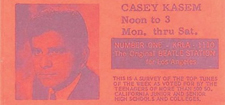
- Called himself "Casey at the Mike" early in his career; started using Casey Kasem permanently at KRLA Los Angeles in the 1960s.
- National Top 40 was considered as a name for what became American Top 40; it was scrapped partly because "American" worked better for foreign sales.
- The first AT-40 was recorded in real time and took 18 hours; it wasn't voice-tracked until 1972.
- A strict vegan, Kasem wouldn't even endorse cereals, because they are usually served with milk.
- Did voice-acting until he was 81, finally retiring in 2010 after a four-and-a-half decade career in the field.
Enjoy
Casey Kasem on
KRLA
here.
![]()
(The Bill Dulmage Collection)
Talent: GARY
PALANT, JEFFERSON K. (SHADOE STEVENS)
Station: KIKX
Tucson, AZ
Date: June 19, 1967
Time: 47:28
(unscoped)
15:55 (scoped)
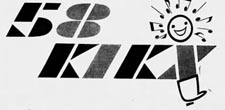
A couple of jocks who started in 1957 are featured a decade later from the Summer of Love.
Gary Palant was a well-established jock when he arrived at KIKX in 1967. He started in radio in 1957 in KTKT in Tucson. After a number of stops that included KPOI Honolulu and KDAY Los Angeles, Palant landed at KIKX. From there he went to the program director's job at CKFH in 1969, then moved to the legendary WNEW-AM in 1970. Palant died of melanoma in October 2002.
Shadoe Stevens - heard here as Jefferson K. - like Palant started in radio in 1957. The man born Terry Keith Ingstad first cracked open the mic at KEYG in his hometown of Jamestown, North Dakota. He moved to stations in Grand Forks and Fargo, and by 1968 had made it to one of North America's biggest rockers, WRKO Boston, in 1968. Since then he has built a spectacular career as a disc jockey, voice-over artist, TV personality, programmer and actor, while also authoring several children's books.
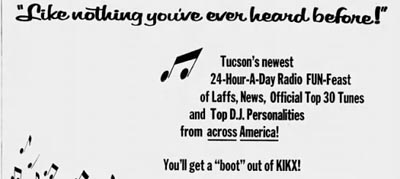
Enjoy Gary
Palant and Jefferson
K. (Shadoe
Stevens) at KIKX (UNSCOPED) here. ![]()
Enjoy Gary
Palant and Jefferson
K. (Shadoe
Stevens) at KIKX (SCOPED) here. ![]()
(The Joe Fazio
Collection)
Talent: DEAN
ANTHONY
Station: WMCA
New York
Date: July 15,
1967
Time: 20:35

"I don't know anyone who didn't like him." - Frank Brinka, WHLI news director
He wasn't just a "Good Guy" - he was a good guy.
Brooklyn-born Dean Anthony started at WMCA in November, 1964. He soon became an institution on the all-night show, with a personality-based show that included the Actors and Actresses game - "No prizes, just for fun" - and Group Therapy. Part of the legendary Good Guys lineup that included Joe O'Brien, Harry Harrison, Jack Spector, Gary Stevens and Dan Daniel, Anthony left WMCA as part of a major shake-up at the station in 1968. Anthony returned to WMCA six months later and did some fill-in work until 1970, the year the station switched from music to talk.
Anthony played country music at WJRZ (later WWDJ) in Hackensack, New Jersey, from 1970 until 1971 when he began a 10-year stint at WTFM New York. During a labour strike at WTFM in 1981, Anthony picked up part-time work at WHLI Hempstead, New York. He stayed there 22 years, twice being named program director of the year by Barnstable Broadcasting.
Anthony died of cancer in 2003 at the age of 68, and was buried with his Mets cap. He was so highly-regarded that WHLI held a 10-hour tribute to him on the fifth anniversary of his death. For years, Anthony played I Think of You by Perry Como every day at 12:40 p.m., and the station continued that practice in his memory.
Before coming to WMCA, Anthony was program director and afternoon personality at WPGC Washington, D.C., from 1960 to 1964. Prior to that, he was at WGH Norfolk, Virginia.
One interesting (and rather eerie) part of this aircheck is the commercial featuring Sharon Tate at the 6:05 mark. Tate and several others would be murdered by Charles Manson's followers just two years later.
Enjoy
Dean Anthony on
WMCA here.
![]()
(The Don Shuttleworth Collection)
Talent: DAN
INGRAM
Station: WABC New York
Date: July
22, 1967
Times: 46:15/45:54
(unscoped)
30:59/30:02
(scoped)
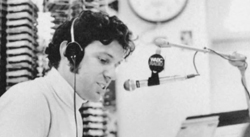
Dan Ingram used words like a musician uses notes.
For nearly a half-century, Ingram weaved double entendres, satire and wit and into a fast-paced Top 40 radio patter unmatched in the industry. When he was inducted into the Radio Hall of Fame in 2007, it was a long overdue honour for one of the giants of the industry.
Daniel Trombley Ingram was born September 7, 1934 in Oceanside, New York. Both of his parents were musicians, and he was inspired to go into radio after attending music sessions with his father. With Al "Jazzbeaux" Collins and Alan Freed as his influences, Ingram began his broadcasting career at WHCH at Hofstra College in Hempstead, New York. Early professional stops were WNRC New Rochelle, New York, and WALK Patchogue, New York. By 1958, he was on WNHC New Haven, Connecticut, under his real name and also at WICC Bridgeport, Connecticut, as Rae Taylor.
Ingram got his first major market gig at KBOX Dallas in 1959, and helped that station dramatically improve its competitive position against rival KLIF. He moved to WIL St. Louis in 1960 where he increased ratings in his morning time slot from a zero to a 48 share, and also met his lifelong friend Ron Lundy. By 1961 he had left radio briefly to work at a company that created promos for radio stations. After turning down an offer to do afternoon drive at WMCA, Ingram applied at WABC and started there in the summer of 1961.
Except for a short stint in morning drive in 1979-80, Ingram held down the coveted afternoon drive spot at WABC for 21 years. It was at WABC Ingram uttered many of the patented lines, like "Hi Kemosabe", "Roll your bod", "You're in the honour group of the day", "On the Ingram Flingram" and "Zay gezunt", a Yiddish expression meaning "be well." When WABC switched to a talk format, it was Ingram who along with long-time friend and long-time WABC midday jock Ron Lundy who signed off the music era on May 10, 1982.
In 1984 and 1985, Ingram did CBS Radio's Top 40 Satellite Survey,
while also holding down a regular shift at WKTU New York. From October
1991 to June 2003, Ingram joined many other legendary New York jocks at WCBS-FM,
where he did early afternoon weekend shifts. He continued as one of North
America's leading voice-over personalities well into the 2000s. Dan
Ingram died June 24, 2018 at the
age of 83.
Enjoy Dan Ingram on WABC (Part
1, UNSCOPED) here. ![]()
Enjoy Dan Ingram on WABC (Part
1, SCOPED) here. ![]()
Enjoy Dan
Ingram on WABC (Part
2, UNSCOPED) here. ![]()
Enjoy Dan
Ingram on WABC (Part
2, SCOPED) here. ![]()
(The Don Shuttleworth Collection)
Subject: CFUN
SOUNDATHON #14
Station: CFUN
Vancouver
Date: July
22-23,
1967
Times: 15:43/15:53/20:33/22:26
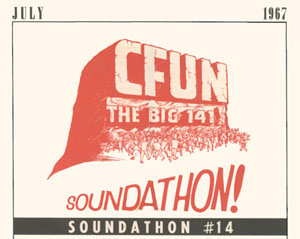
Description by Jim Bower
Soundathon was CFUN's twice annual extravaganza of hits from the past. Listeners voted for their favourite "flashbacks" and these were tallied and played in countdown order near the year's end or in mid-summer. The first Soundathon was in late December 1960 and featured only 60 ranking songs, all from that year. Soundathon #2 was a Top 100 and took place during the summer of 1961, covering the period back to July 1960. Soundathon came of age with Number 3 in late December 1961. This time 300 ranking songs were included, tallied from over 101,000 votes. And this time it included the Rock and Roll years back to 1955.
Beginning with Soundathon #4 in the summer of 1962, the Summer Soundathons featured only hits of the past summers. Hits were listed in groups by year and there were no rankings. Soundathons #4 and #6 were likely never printed but later summer Soundathons were.
The winter Soundathons continued the ranking of 300, as did the last Soundathon #14 in July 1967.
Soundathon was a favourite and much-anticipated event on "Funland" radio CFUN.
Enjoy Part 1 of Soundathon #14 - with Lee Gaboury and Terry David Mulligan -
here.
![]()
Enjoy Part 2 of Soundathon #14 - with Red Robinson, Neil Soper, Terry David Mulligan,
John Tanner, Peter Alpen -
here.
![]()
Enjoy Part 3 of Soundathon #14 - with
Lee Gaboury and Peter
Alpen - here. ![]()
Enjoy Part 4 of Soundathon #14 - with Lee
Gaboury - here. ![]()
(Vancouver Top 40 Radio/Jim Bower - Used with permission)
(The Frank Carpenter Collection)
* this aircheck was sent to us by Paul Wolski
![]()
Subject: CFOM
composite
Station: CFOM
Québec
City
Date: 1967-71
Time: 1:49
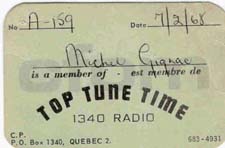
(Description by Michel Gignac)
Prior to becoming a full-time top 40 station CFOM carried a few popular music
shows especially on weekend. Top Tune Time and The Million Dollar Weekend were
its most listened-to programs in the late 60’s and early 70’s.
As explained elsewhere on Rock
Radio Scrapbook, CFOM stopped carrying the CBC programs for which it
was licensed in the Québec City market turned its variety format to a top 40
format and later lost its license.
On this short composite aircheck from the 1967-1971 era you will hear the
following disc jockeys: John Mariasini, Jay Silver, Ron Habel and
Bill Kaye.
Hear the CFOM composite here.
![]()
(The Pierre Tremblay and Michel Gignac Collections)
Special thanks to Marc Denis for his fine audio editing on this aircheck!
Talent: MIKE
SHEPPARD
Station: KDIA
Oakland, Calif.
Date: July 19,
1967
Time: 5:20
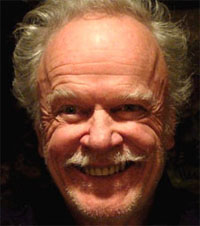
(Photo courtesy Michael C. Gwynne)
With eclectic playlists and free-spirited announcers, CKFH and CHUM-FM provided Toronto radio listeners with some great listening in the late 1960s and early '70s. Michael C. Gywnne had the rare honour of working at both during that time period. But that was only part of his fascinating career.
Gwynne tells Rock Radio Scrapbook about his radio years:
"It was a great time to be in radio. The only other great time is of course the "Golden Era", with all the great drama shows.
My first job was at CFTJ in Galt which is now Cambridge. I was hired as a summer addition to a 250-watt station that went from sunrise to sunset. In the summer they needed another guy for the extra hours.
I was 18 and had a missing front tooth though I spoke perfectly. I was then going to Central Tech in Toronto doing the radio course there but found it woefully lacking after having actually been on the air for two months so I left and went back to CFTJ begging for my old job.
They had already hired another guy ... but he told me about an offer at CKLY in Lindsay. So I hitched there and got the job immediately starting the next morning at 6.
Several months of MOR radio ensued but I longed to be a Top-40 guy so I auditioned at CKPT Peterborough and got that job for the summer. Thence to CHEX and CFMO-FM in Ottawa.
After a journey to San Francisco in January of 1964 I realized I had better offers in the USA so I took one at WNAT Natchez, Mississippi, cuz I loved that R&B music. Thence to WKRG in Mobile, Alabama, and finally back to California.
KMAK in Fresno got me and I met Bill Drake who was then in the middle of creating his Drake format which I did NOT like so I passed.
KMBY in Monterey called and was a big hit for me cuz they called from Honolulu and shipped me over there to be on KPOI where I did the All-Night House Party and played the drums in a Drumathon to introduce me to the Island. I broke the Guinness Record of 89 hours by playing from Tuesday night at 6 to Saturday afternoon at 3. Total of 92 hours.
Back to California after two years in Hawaii and again at KMBY until Bill Doubleday, the PD at KDIA in San Francisco, came down to listen to my show and hired me the next day. It was he who gave me the name Mike Sheppard cuz Alan Shepard had just walked on the moon (ed: he hadn't yet but would a few years later). Not sure how it was ever spelled. (ed: a KDIA chart from November 13, 1966 spells it Shepherd.)
Two years in San Francisco till WWRL in New York and I got to study some acting classes with Stella Adler.
Then Glenn Walters of CKEY fame called and said CKFH had a format change and wanted me to join him and Kenny Wells in Spring of 1968. CHUM-FM and Murray the K contacted me cuz FH wasn't giving me a full shift and I went over to CHUM.
Did a few days on AM but mostly FM until the end of '68 when I decided to try my hand in Hollywood.
I ended my radio days at KGFJ in Hollywood where I was Lee Vaunce cuz TV and movie parts were coming my way and the radio game was beginning to change to the Drake format which cut back on "personality" radio and began the "more music" approach which made me feel like an engineer rather than an entertainer.
It was a great decade and sadly NOTHING remains of my radio personalities and there are many styles and names, but this snippet from KDIA in July of 1967."
The Detroit-born Gwynne pursued an acting career that saw him appear on such shows as Simon and Simon, Knight Rider, MacGyver, Falconcrest, Baretta and Hill Street Blues. He was also in the Howard Stern movie Private Parts.
Enjoy
Mike Shepherd on
KDIA here.
![]()
(The Michael C. Gywnne Collection)
Talent: ED
STEWART
Station: RADIO
LONDON
Date: July
22, 1967 (re-creation)
Time: 10:37
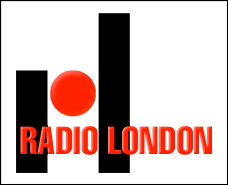
They were known as the 'pirates', a
feisty group of offshore radio stations that set U.K. and European radio on its
ear beginning in the 1960s. One of the most well known was
Radio London, which went on the
air December 23, 1964 and enjoyed a colourful two-and-a-half year history. Among
the 30 deejays who appeared on the Radio London
airwaves were such legends as Tony Windsor,
Kenny Everett,
Norman St. John,
Mike Lennox and
Ed Stewart. The British
government shut down Radio London
on August 14, 1967 but not before a lot of great radio was made.
Enjoy this re-creation of the Ed
Stewart show on Radio London here.
![]()
(The Mark Panopoulos Collection)
Talent: DON
BERNS
Station: WDRC
Hartford
Date: August
25, 1967
Time: 31:37
(unscoped)
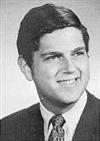
One of the all-time great personality jocks, Don Berns made his mark on both sides of the border.
The son of a West Hartford dentist, Berns got his start in radio at WICE Providence, Rhode Island, in 1967. Later that year, he jocked in his hometown at WDRC-FM, which had just started original programming separate from WDRC-AM for certain hours of the day.
Many Canadians might have heard Berns for the first time at WKBW, where he arrived in 1970 after a stop at WTRY Albany, New York. Berns left 'KB in 1975 for s short stay at cross-town rival WYSL/WPHD then it was on to KLIF Dallas (1975), KFMB-FM San Diego (1976), WHB Kansas City (1977) and WTAE Pittsburgh (1979).
In 1985, Berns came to Canada at CFNY Toronto, where he was program director for a time. He was also at CKEY Toronto (1989) and later at CING-FM (Energy 108) Burlington, Ontario, CIDC (Power 88.5) Newmarket, Ontario, and Toronto stations CHIN-FM and CILQ (Q 107). Berns had quite a following as "Dr. Trance" on his alternative dance show on Energy 108 beginning in 1992. He took his character and show to the Internet (Virtually Canadian) in the late '90s, becoming one of the first major radio personalities to embrace the new medium.
An accomplished actor and voice-over specialist, Berns has some interesting comments about radio in a 1983 interview with Bob Paiva for his book, The Program Directors Handbook.
Berns died March 1, 2015. He was 67.
Enjoy
Don Berns on
WDRC
here.
![]()
(The Don Shuttleworth Collection)
Talent: DON
BERNS
Station: WDRC
Hartford
Date: August
26, 1967
Time: 31:02
(unscoped)
10:21 (scoped)
More of the great Don Berns, from a day later (with a little bit of Brad Field).
Enjoy Don Berns on WDRC here. (UNSCOPED) ![]()
Enjoy Don
Berns on WDRC here. (SCOPED) ![]()
(The Joe Fazio Collection)
|
|
Talent: DON
PHILLIPS
Station: WLS
Chicago
Date: August
25, 1967
Time: 24:46
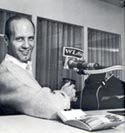
Don Phillips was both on the air and in the air.
A licensed pilot, Phillips hosted the East of Midnight all-night show on Chicago's WLS in the 1960s. Nicknamed "Dimple Donnie", the Milwaukee native even carried a picture of his beloved Ryan 260 Navion in his wallet, according to a 1960s article in WLS Magazine. The four-seat, single-engine plane helped get Phillips to record hops and other personal appearances during his WLS days.
Phillips got his radio start at WRJN Racine, Wisconsin, and went from there to WAUX Waukesha, Wisconsin, and WOKY and WRIT in his hometown. He took over the all-night show in 1963, following in the footsteps of Joe Kelly, Clark Weber and Bob Hale, who created the East of Midnight name when he took over the overnight slot at the beginning of WLS' Top 40 era in 1960. After departing WLS in the latter half of 1967, Phillips became a options trader on the Chicago Board of Trade. Jerry Kay took over the all-night show after Phillips left and the "East of Midnight" branding disappeared in the late '60s.
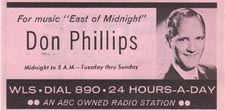
"The 50,000 watt signal of WLS booms out pretty far at night when the airwaves are less cluttered. I have had listeners call from as far away as Texas and California," Phillips told WLS Magazine in the 1960s. "When I first started the East of Midnight time slot, I was a little worried that the only listeners around would be truck drivers and bartenders. Well, it turned out that we have some of these, but we also get calls and letters from doctors, nurses, firemen, policemen, and thousands of other people in Chicagoland who work while the rest of the world is asleep."
Enjoy Don Phillips with East of Midnight
on WLS here.
![]()
(The Don Shuttleworth Collection)
AUDIO ENHANCEMENT by Andy Rebscher
Talent: JACK
ARMSTRONG
Station: WKYC
Cleveland
Date: September
24, 1967
Time: 46:26 (unscoped)
21:45 (scoped)
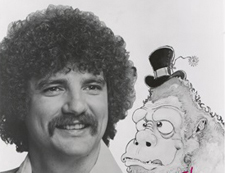
He was large, hairy and existed only in the mind of legendary Top 40 jock Jack Armstrong.
He was The Gorilla.
Throughout much of his career, Armstrong used an imaginary sidekick he called The Gorilla on his shows. The friendly though sometimes grumpy primate spoke in a deep-throated bass, and liked women, banana juice and whiskey in that order. Armstrong - who did the voice live - used the character a lot early in his career but phased out the big ape later on. It was a big part of his act, and showcased the quick wit that was a hallmark of Armstrong's career.
Armstrong also had another character, the Old Timer. Not utilized as much as The Gorilla, the Old-Timer wheezed, told lame jokes, and always got shot at the end of the bit.
Enjoy Jack
Armstrong - and The
Gorilla - (UNSCOPED) here.
![]()
Enjoy Jack
Armstrong -
and The
Gorilla -
(SCOPED) here.
![]()
(The Don Shuttleworth Collection)
Talent: DICK
BIONDI
Station: WCFL
Chicago
Date: October
3, 1967
Time: 54:27
(unscoped)
23:32 (scoped)
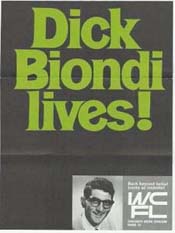
Chicago - it has always been Dick Biondi's kind of town.
The fast-talking, quick-witted Biondi was part of the original lineup when WLS became a Top 40 station in 1960 - he was there for three memorable years. In 1983 - after briefly working at WBBM-FM - he helped launch Chicago's long-time oldies outlet, WKMK-FM in 1984. He spent some two decades there before moving to WLS-FM in 2006.
Biondi also starred at WLS Top 40 rival WCFL. Biondi - on this aircheck sounding somewhat more subdued than in his wild WLS days - had a five-year run at WCFL beginning in 1967 before moving to yet another Chicago station, WMAQ. He left Chicago in 1972 and worked for the next decade at WBZ Boston, WSAI Cincinnati and WNMB North Myrtle Beach, South Carolina.
Biondi died June 26, 2023 at age 90.
Hear Dick
Biondi's first
show on WCFL (UNSCOPED)
here. ![]()
Hear Dick
Biondi's first
show on WCFL (SCOPED)
here. ![]()
(The Don Shuttleworth Collection)
Talent: JACK
GALE
Station: WAYS
Charlotte, N.C.
Date: October
3, 1967
Time: 1:03:03
(unscoped)
42:32 (scoped)
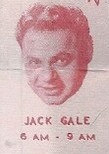
Lots to like on this wonderful aircheck of the late Jack Gale.
Aside from hearing one of the great personality jocks of the era, there's an interesting mix of country and rock (mostly Motown) music, a spot for direct dialling phone calls (remember when you had to go through an operator to make a long-distance call?), some great local ads, a full newscast with all the bells (literally) and whistles (and teletype sounds), plus those wonderful WAYS jingles. A 1967 time capsule indeed, and free for the clicking at Canada's Aircheck Archive!
Jack Gale died January 23, 2018 at the age of 92.

Enjoy Jack
Gale at WAYS (UNSCOPED) here. ![]()
Enjoy Jack
Gale at WAYS (SCOPED) here. ![]()
(The Don Shuttleworth Collection)
Talent: B.
MITCHEL REED
Station: KFWB
Los Angeles
Date: October
6, 1967
Time: 12:39
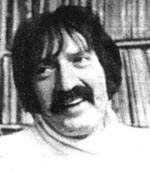
To those used to the fast-talking B. Mitchel Reed of WMCA fame, this aircheck will come as a surprise.
Reed gained much of his early celebrity as as high-energy deejay during his time in the 7-11 p.m. shift at WMCA from 1963 to 1965. But his approach changed dramatically when he returned to KFWB Los Angeles in 1965, the station where he jocked from 1957 to 1963 as The Fastest Tongue in the West. Gone were the horns and whistles that punctuated his lightning-fast WMCA delivery. In its place was a more introspective announcer who spoke in a conversational way, much as he would have done when he was a jazz announcer at WOR New York in 1956.
Reed went on to become a very successful progressive rock jock, with stops at KPPC Pasadena, California, and Los Angeles stations KMET-FM, KRLA and KLOS from the late '60s through the early '80s. In 1981, he became the first host of ABC's Rockline, with Joe Walsh as his first guest. Reed was only 56 when he died of heart problems on March 16, 1983, but he left behind a rare legacy as a jock who was successful in both the Top 40 and album rock formats.
Enjoy
B. Mitchel Reed on
KFWB here.
![]()
(Scrapbook archives)
Talent: BUD
BALLOU
Station: WKBW
Buffalo, N.Y.
Date: October,
1967
Time: 5:55
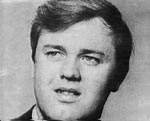
It was 1967 and for a Top 40 deejay, the night shift on one of the big 50,000-watt blowtorches was the place to be.
On WABC New York, Cousin Brucie rode the evening airwaves with a signal heard all over eastern North America.
The big signal of WLS got out pretty well, to put it mildly, helping evening deejay Art Roberts establish quite an audience all over North America.
Among Canadian stations, Windsor's CKLW had a 50,000 watt signal as did CHUM Toronto and CFUN Vancouver. But it wasn't until the night-time - when the "skywave" kicked in - that those AM signals really carried.
WKBW
claimed its signal could be heard in 17 states and Canada. They were being
modest - the 'KB signal has been picked up in Scandinavia.
In October 1967, Bud Ballou held the coveted night-time spot at 'KB having
replaced Joey Reynolds earlier in the year. Ballou, who also jocked in Boston,
Denver and Syracuse, New York, died in 1977 at age 54.
You can hear him here.
![]()
(Scrapbook archives)
Talent: JOHN
SPRAGGE and DUFF ROMAN
Station: CHUM
Toronto
Date: November
15, 1967
Time: 21:32
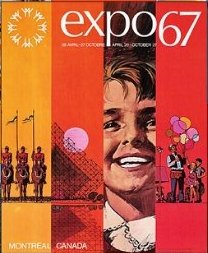
Ninety-sixty-seven is remembered for the Summer of Love, flower-power and the emergence of album rock. But for Canadians it was something extra special - it was Centennial Year.
The Dominion of Canada was formed on July 1, 1867 when three colonies - Canada (Ontario and Quebec), New Brunswick and Nova Scotia - were granted a constitution by the United Kingdom. A hundred years later, Canada stretched from sea-to-sea with 10 provinces and two territories - the second-largest country in total area in the world. It was time for a celebration!
That celebration was Expo 67 - formally called the 1967 International and Universal Exposition. It opened to the public April 28, 1967 on the site which encompassed Saint Helen's Island and the artificial island of Ile Notre Dame in Montreal. By the time it closed on October 27, more than 50 million people had passed through its gates - still a record for a World's Fair. Among the notables who visited: Queen Elizabeth II, U.S. President Lyndon Johnson, Princess Grace of Monaco and French President Charles de Gaulle.
Built in less than three years, Expo 67 was a tremendous achievement. There were 90 pavilions for various nations, regions, corporations and industries. Some of the architecture was stunning, from the Buckminster Fuller-designed U.S. pavilion to the imaginative Canadian pavilion (see below). The site continued as Man and His World for several years (the last of the original exhibits closed in 1982), and is currently home to the Montreal Casino, the amusement park La Ronde and several acres of parkland and bicycle paths. The old U.S. pavilion still stands; it now houses a science museum.
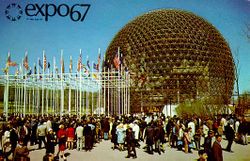
U.S. pavilion
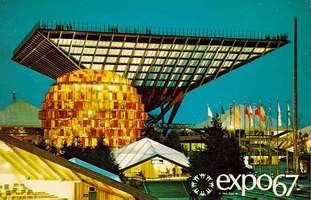
Canadian pavilion
We haven't found a lot of Canadian Top 40 airchecks from 1967, but we do have this one from CHUM. On it, you'll hear midday jocks John Spragge and Duff Roman along with newsman Gene Scott. They were part an impressive on-air staff that also included jocks Jay Nelson, Bob McAdorey, Brian Skinner and Bob Laine and talk show host Larry Solway.
Enjoy this CHUM aircheck here.
![]()
(Scrapbook archives)
Talent: MICHAEL
CRANSTON
Station: CHUM
Toronto
Date: December
21, 1967
Time: 41:27
(unscoped)
(Upgraded
12-16-12)
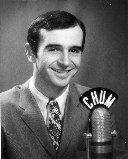
(Courtesy Doug Thompson, The CHUM Archives)
Michael Cranston appeared to be one of CHUM's rising stars when he arrived in the summer of 1967 from CKSO Sudbury, Ontario. He did weekends and swing but was gone by the end of the year.
After CHUM, Cranston was morning man at CFRN Edmonton and network anchor/program director at CFRN-TV (1972-76), then was an announcer at CKSO radio and TV (1976-79). He became news director of the Maritime Broadcasting System in 1979 where he stayed until his retirement in 2010. He founded G. Michael Cranston Productions in 2000.
Prior to CHUM, Cranston was also at CJOY Guelph, Ontario, where fellow CHUM jock Bob McAdorey once worked. Post-CHUM, Cranston was also at CKPG Prince George, B.C.
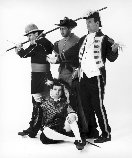
(L-r: Bob Laine, Michael Cranston (seated), Dick Hayes, John Spragge/Courtesy Doug Thompson, The CHUM Archives)
This aircheck captures Cranston near the end of his time at CHUM. In addition to Cranston, you'll hear the voices of Wally Crouter, Bob McAdorey and Larry Solway in commercials. A full newscast with Peter Dickens and commentary with Phil Givens and Mac Lipson round out this interesting look at CHUM at Christmastime, 1967.
Hear
Michael Cranston on
CHUM here.
![]()
(The Bill Dulmage Collection)
For more classic CHUM airchecks, visit The CHUM Archives
|
|
Talent: RON
KNIGHT
Station: KTKT
Tucson, Arizona
Date: December
21, 1967
Time: 30:54 (unscoped)
14:10 (scoped)
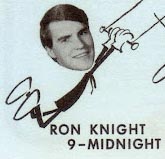
Ron Knight jocked at WING Dayton under program director Bob Holiday, before both moved to KTKT. Later Knight (not to be confused with the Ron Knight at CHUM and CFGM in the Toronto market) would be found in the Detroit market (as Sean Conrad) at WKNR Dearborn, before heading west to KSLX-FM San Francisco. Oddly enough, Knight's competition at rival KIKX was Dino Day. Night, day?
KTKT went on the air in 1949, and seven years later started programming Top 40 music. It quickly became Tucson's #1 station, a status it maintained until the early '80s. With listenership declining, KTKT dropped Top 40 in late 1985.
Hear Ron Knight on KTKT (UNSCOPED) here. ![]()
Hear Ron Knight on KTKT (SCOPED) here. ![]()
(The Joe Fazio Collection)
Talent: BERNIE
ALLEN
Station: WLS
Chicago
Date: December
30, 1967
Time: 12:26
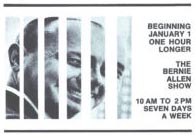
It seems like a long time
ago now, but there was a time when Top 40 music could be heard regularly across
the continent on big-signal AM radio stations. Deejays like
Cousin Brucie of
WABC New York,
Art Roberts of
WLS Chicago and
Joey Reynolds of
WKBW Buffalo,
New York, were household names in dozens of states and provinces across North
America.
But this only applied at night, when the signals of these 50,000-watt blowtorches bounced all over the continent via what is known as skywave. The daytime programming of these stations remained a mystery to those outside the regular listening area (the signals didn't carry nearly as far by day). Now, many years later - via the Internet - we can hear what those stations sounded like in the daytime.
Bernie Allen was a regular daytime presence at WLS in the 1960s.
Listen to him here.
![]()
(The Dan Steeves
Collection)